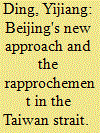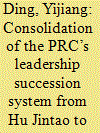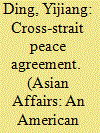| Srl | Item |
| 1 |
ID:
092637


|
|
|
| 2 |
ID:
136991


|
|
|
|
|
| Summary/Abstract |
The People’s Republic of China went through a peaceful and orderly transfer of power from November 2012 to March 2013, the second one in its 64-year history. The first one was the 2002–3 change of leadership from Jiang Zemin to Hu Jintao. While largely following the same pattern, the recent leadership change, from Hu Jintao to Xi Jinping, illustrated a few interesting and potentially significant differences even as the succession system was further consolidated. This article compares the recent leadership change with the previous one, analyses the differences and discusses their political implications. The increasingly institutionalised procedure for China’s leadership succession now features the state leaders’ tenure being limited to two consecutive five-year terms, and the choice of successors through a gradually broadening elite consensus. For the Chinese Communist Party, the purpose of the term limit is to prolong its one-party rule by having orderly power transfers and avoiding succession crises. The limited term of office is likely to contribute to China’s political stability while promoting a degree of institutionalised intra-party factional competition.
|
|
|
|
|
|
|
|
|
|
|
|
|
|
|
|
| 3 |
ID:
113043


|
|
|
|
|
| Publication |
2012.
|
| Summary/Abstract |
In spite of the fact that substantial progress has been made in the improvement of relations between China and Taiwan, 1
there have been no talks on sensitive political issues. Beijing's proposal for a cross-strait peace agreement is put on hold. Disagreement over the sovereignty of one China and the political reality in Taiwan have conspired to create an apparent impasse and contributed to an indefinite delay of the negotiations. At the moment, a large section of Taiwanese people do not seem to want this peace agreement. The ruling Chinese Nationalist Party (KMT) cannot afford to start negotiations without a strong domestic consensus. This article examines the political situation in Taiwan, analyzes the main obstacles to reaching a cross-strait peace agreement, and explores possible solutions.
|
|
|
|
|
|
|
|
|
|
|
|
|
|
|
|